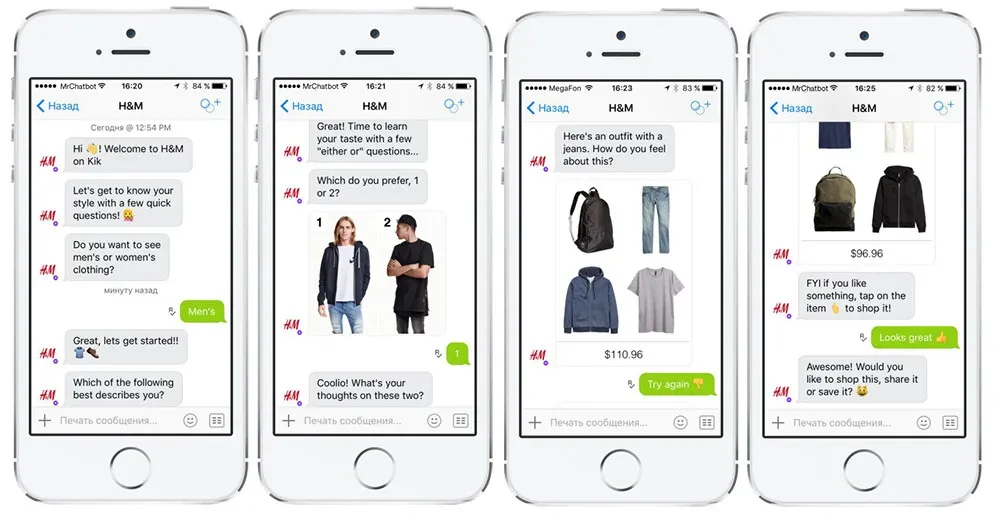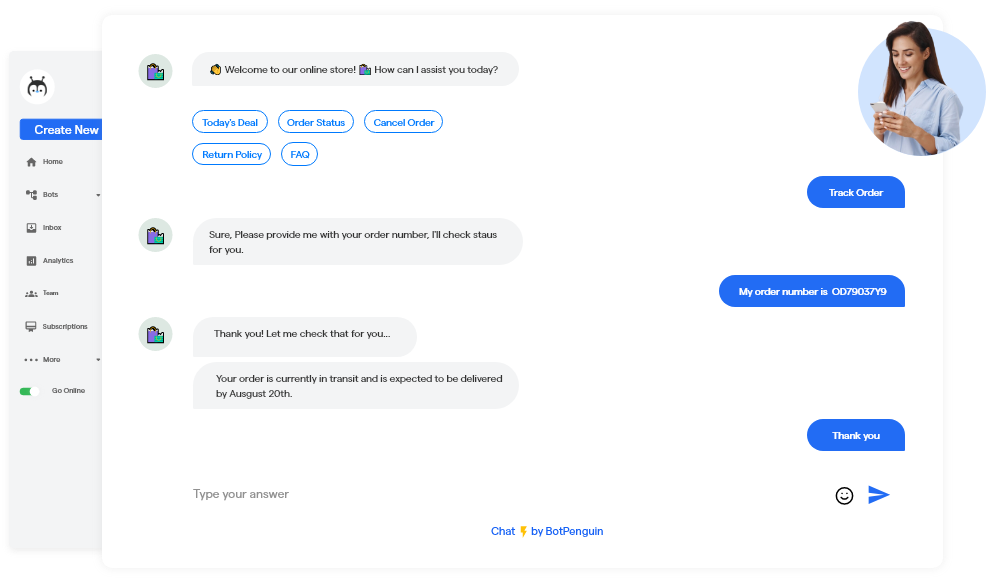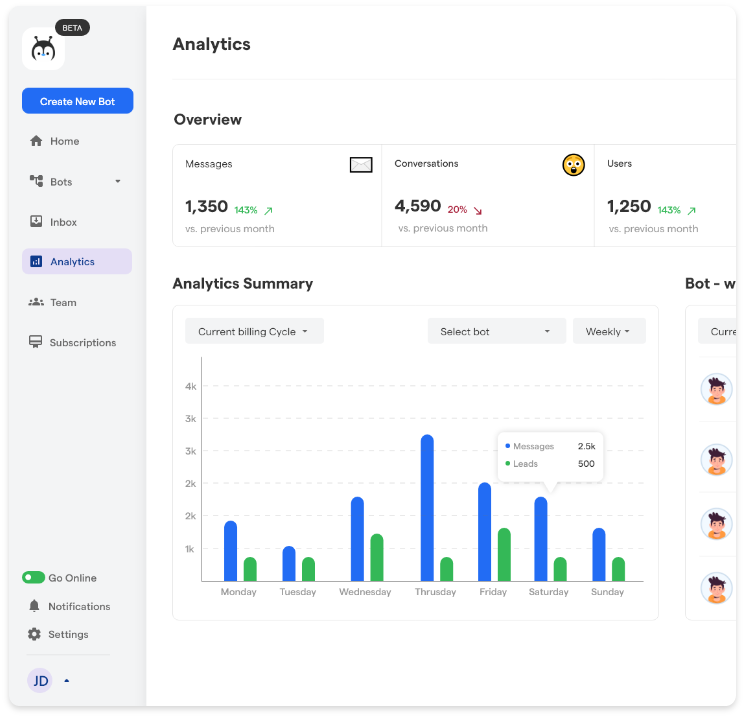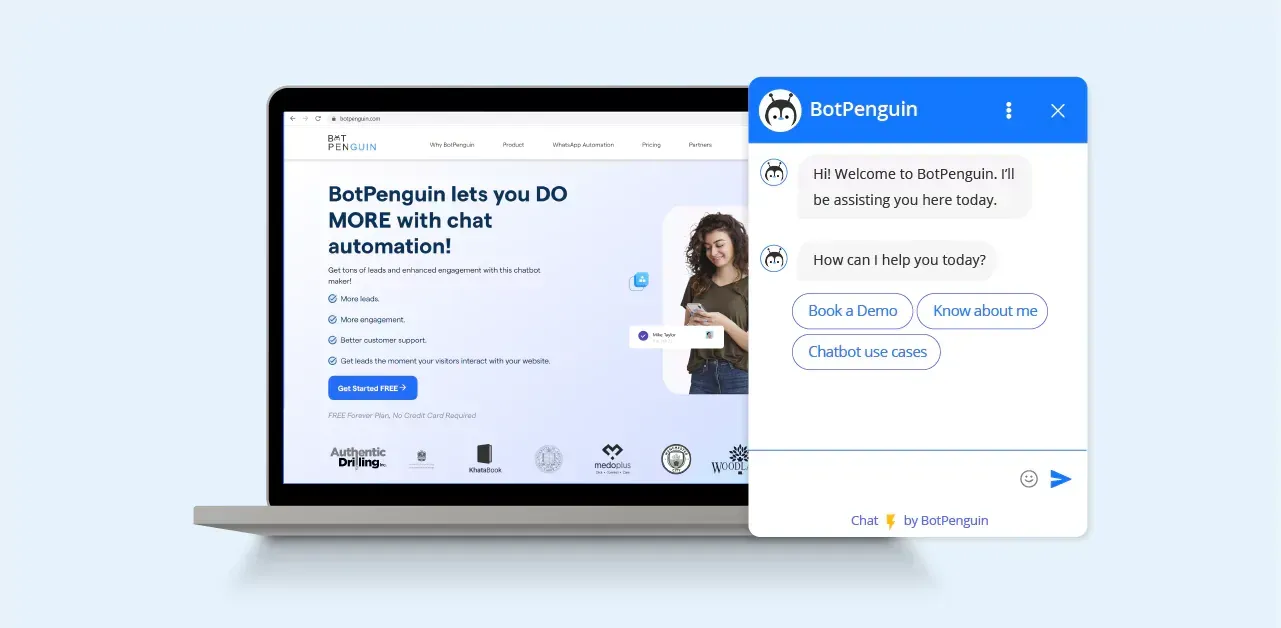Artificial intelligence and chatbots are transforming ecommerce marketing. These smart technologies provide the personalization and instant support today's customers expect. The data shows implementing AI pays off - according to Social Media Today, 63% of digital leaders say AI is crucial to remain competitive.
Specifically, chatbots enable 24/7 assistance via conversational interfaces on websites, messaging apps, and more. Ecommerce brands utilize chatbots for personalized recommendations, onboarding, order tracking, and post-purchase care.
With conversational commerce exploding, chatbots now provide a scalable way to humanize the customer journey through automated yet personalized guidance. Leading e-commerce brands are already seeing immense benefits.
Sensory found that 66% of consumers now regularly use chatbots. And, HubSpot reports including chatbots have increased conversion rates by as much as 15%.
Beyond chatbots, AI powers product discovery through visual and voice search, customized promotions via machine learning, predictive analytics, and more. Together these innovations optimize the digital journey to attract and retain customers.
With global reports projecting ecommerce will reach $5.4 trillion by 2022, AI and chatbots create the experience customers demand in this rapid growth market.
For forward-thinking brands, adopting AI is now a necessity to thrive in ecommerce long-term. So continue reading to find out more about it.
Role of Chatbots in E-commerce Marketing

Chatbots are an integral part of e-commerce marketing, and they are commonly used on websites, social media platforms, and messaging apps to provide personalized support to customers. Let's look at the definition of chatbots and their functionalities, as well as their benefits in e-commerce marketing.
Definition of Chatbots and Their Functionalities
Chatbots are computer programs that can handle requests and inquiries from customers and provide quick and efficient replies.
Chatbots use natural language processing (NLP) technology to understand customer queries and provide relevant responses. This means that they can understand and interpret natural human language, which makes them an ideal solution for customer support.
Benefits of Using Chatbots in E-commerce Marketing
Integrating a chatbot with your online store or mobile app provides the following key benefits:
24/7 Personalized Guidance

Chatbots powered by natural language processing can provide customers with instantaneous, personalized support and answers at any time of day. Rather than waiting for human reps, shoppers get their questions addressed immediately through natural conversations.
Higher Engagement Rates
Chatbot marketing increases engagement by making interactions more intuitive. Messaging apps show open rates of over 90%, and chatbots maintain dialogues versus one-off emails. The conversational experience helps brands connect better.
Lower Service Costs
Chatbot marketing automates commonly asked questions to reduce call volume to support reps. Simple inquiries about shipping status, returns, and product details are handled automatically to lower overhead. Agents focus on complex issues.
BotPenguin's chatbots automate simple ecommerce questions so agents resolve complex issues. Conversational AI handles shipping, returns, product details, and more, lowering overhead. With free and paid plans, BotPenguin optimizes resources so support teams can focus on providing exceptional assistance.
Increased Conversions
Chatbots guide customers seamlessly through purchase journeys by providing product recommendations, inventory data, and checkout assistance. Abandoned cart bots encourage completing purchases later.
Better Lead Qualification

Smart chatbots ask qualifying questions during conversations to identify prospect needs and route them appropriately. Sales teams gain higher quality leads through E-commerce marketing.
Enhanced Personalization
Based on past behaviors and stated preferences, chatbots deliver individualized product suggestions, custom content, and tailored offers that resonate better.
Expanded Marketing Reach
Chatbots extend engagement to popular messaging apps like WhatsApp, Facebook Messenger, and WeChat where consumers spend time. New demographics are reached.
Improved Data Capture
Chatbot marketing engages customers in a two-way dialogue capturing contact details, preferences, and other data. CRM profiles become richer.
Suggested Reading:
Streamlining Sales and Conversions with AI and Chatbots
AI technology is a game-changer when it comes to lead nurturing and optimizing conversions. Let's look at how AI can help drive sales and conversions in e-commerce marketing.
Leveraging AI for Lead Nurturing and Conversion Optimization
AI algorithms can analyze customer data, including browsing history and purchase behavior, to identify potential leads and their likelihood of conversion. E-commerce marketing allows e-commerce businesses to target their marketing efforts towards the most promising leads, increasing the chances of conversion.
Furthermore, E-commerce marketing can automate lead nurturing processes by sending personalized and timely messages to potential customers based on their behavior and preferences. This helps keep leads engaged and increases the likelihood of conversion.
Utilizing Chatbots for Real-time Customer Support and Sales
Chatbot marketing is not only great for improving customer experience but also for streamlining sales and boosting conversions. Here's how chatbots can be utilized to their full potential.
The immediate assistance can help potential customers overcome any doubts they might have, leading to higher conversion rates.
Moreover, chatbots can act as virtual sales assistants. Using AI algorithms, they can recommend products, provide personalized offers, and even assist in the checkout process. This interactive and personalized shopping experience enhances the chances of making a sale and increases customer satisfaction.
And taking your first step towards Chatbot-enabled automation isn't that tough. Meet BotPenguin- the home of chatbot solutions.
With all the heavy work of chatbot development already done for you, deploy chatbots for multiple platforms and make multi-channel support look easy for business:

AI-driven Data Analytics in E-commerce Marketing
AI algorithms play a critical role in gathering and analyzing customer data for targeted marketing strategies. Let's see how AI-driven data analytics can revolutionize your e-commerce business.
Extracting Valuable Insights for Targeted Marketing Strategies
Once customer data is collected and analyzed, AI algorithms can extract valuable insights that can be used to create targeted marketing strategies.
By understanding customer preferences, businesses can create personalized marketing campaigns that resonate with their target audience. For example, AI can identify which group of customers would be more receptive to discounts, while others might require more product information.
E-commerce marketing can also help optimize marketing channels by identifying which platforms and channels yield the best results. This allows businesses to allocate their resources effectively, targeting the platforms that have the highest potential for conversions.
Suggested Reading:
Overcoming Challenges and Ethical Considerations in E-commerce Marketing
With the rise of chatbot marketing, it's important to address the challenges and ethical considerations that come along with these technologies. Let's explore that:
Addressing Privacy Concerns Related to AI and Chatbots
Privacy has become a significant concern in the digital age, and AI and chatbots are no exception. As businesses leverage these technologies to enhance customer experiences, it's crucial to prioritize user privacy. Here are a few ways to address privacy concerns:
- Transparency in Data Collection and Use
Clear and concise privacy policies should explain what information is gathered, how it's stored, and how it's used to enhance the customer experience. This transparency builds trust with customers and alleviates privacy concerns.
- Secure Data Storage and Encryption
By securing customer data, businesses can provide peace of mind to their customers and mitigate the risks of data breaches. This includes secure data storage practices and encryption mechanisms.
- Giving Users Control over Their Data
Empowering users by giving them control over their data is another effective strategy. Providing options to opt in or opt out of data collection, as well as easy access to viewing and deleting their data, allows users to have a sense of control and keeps privacy concerns in check.
Ensuring Ethical Use of Customer Data in Marketing Practices
When it comes to using customer data for marketing purposes, it's vital to maintain ethical standards. Here are some considerations for ensuring ethical use of customer data:
- Obtain Informed Consent
Before collecting customer data, it's crucial to obtain informed consent. Communicate what data will be collected, and how it will be used, and provide an option for users to provide or deny consent. Respecting user choices and ensuring they understand what they're signing up for is essential for ethical data usage.
- Anonymizing and Aggregating Data
To ensure privacy, businesses can anonymize and aggregate customer data. This means removing personally identifiable information and combining data in a way that preserves privacy while still providing valuable insights for marketing strategies.
Future of AI and Chatbots in E-commerce Marketing
Let's take a peek into the future, predict upcoming trends in AI and explore opportunities for further integration of AI and chatbots in marketing.
Enhanced Personalization
AI will revolutionize personalization in e-commerce. Advanced algorithms will analyze vast amounts of customer data to gain deeper insights and provide hyper-personalized recommendations, offers, and experiences. This level of personalization will significantly enhance customer engagement and drive conversion rates.
Voice-Activated Shopping
The rise of smart speakers and voice assistants will lead to increased voice-activated shopping. AI-powered chatbots will seamlessly integrate with voice-based interfaces, allowing customers to make purchases and get product information using voice commands.
Conclusion
From personalized product discovery to post-purchase care, AI and chatbots are reinventing e-commerce marketing. As consumers increasingly expect personalized, on-demand shopping experiences, AI-enabled capabilities like individualized recommendations and conversational assistants.
But technology alone cannot drive success. With innovations advancing so rapidly, e-commerce leaders also need a focused AI strategy, rigorous testing protocols, and a culture of optimization to realize their full potential. Adopting AI also requires examining ethical factors around transparency and data usage.
With BotPenguin's proprietary natural language processing engine, e-commerce businesses can develop intelligent conversational assistants that engage customers 24/7 via messaging apps and websites. By leveraging leaders in conversational AI, merchants gain an immediate competitive edge through future-facing experiences that deepen loyalty.
Used responsibly, AI unlocks immense opportunities to know each customer, predict needs, and humanize at scale through automation. But prudent, phased approaches are advised over mass replacement of human roles. With the right foundation and governance, AI promises to revolutionize e-commerce into an ultra-personalized, frictionless market space.
Brands that embrace this future today will define the next era of digital commerce.
Suggested Reading:
Frequently Asked Questions (FAQs)
What is the impact of AI on marketing?
AI's impact on marketing is profound, facilitating personalized customer experiences, precise targeting, and data-driven decision-making. It enables marketers to optimize campaigns, predict consumer behavior, and automate tasks, leading to improved efficiency and enhanced customer engagement in the dynamic marketing landscape.
How does artificial intelligence bring a great change in e-commerce?
Artificial intelligence revolutionizes e-commerce by powering personalized product recommendations, enabling efficient inventory management, and automating customer service through chatbots. Its data analysis capabilities also enhance customer insights, leading to improved product offerings and streamlined shopping experiences, ultimately boosting sales and customer satisfaction.
Why is a chatbot important in e-commerce?
Chatbots are crucial in e-commerce for providing instant customer support, addressing queries, and guiding customers through the purchasing journey. They enhance customer engagement, streamline interactions, and contribute to a seamless shopping experience, ultimately fostering customer satisfaction and loyalty in the competitive e-commerce landscape.
What's the impact of AI-powered chatbots on E-commerce?
The immense impact of the AI-powered chatbot marketing comes from their ability to completely transform how customers engage with brands. Instead of frustratingly slow or impersonal interactions, chatbots enable instant, tailored conversations that guide shoppers seamlessly 24/7. Rather than bouncing between channels, customers can find answers, get recommendations, and even complete purchases through intuitive chat-based experiences.
What are the benefits of e-commerce marketing?
The core benefits AI delivers to e-commerce are centered on optimizing the entire customer lifecycle through automation and insights. AI allows e-commerce brands to turn simple product catalogs into smart recommendation engines tuned to each shopper based on past data. Chatbots and AI assistants handle the high-volume repetitive inquiries that formerly overwhelmed human staff. Inventory and supply chain operations are automatically optimized using AI demand forecasting and analytics.


